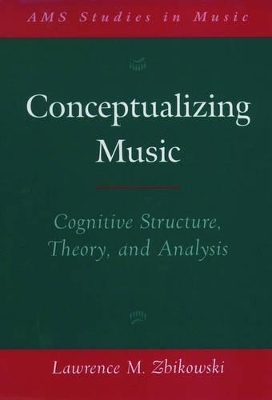
Conceptualizing Music
Cognitive Structure, Theory, and Analysis
Seiten
2002
Oxford University Press Inc (Verlag)
978-0-19-514023-1 (ISBN)
Oxford University Press Inc (Verlag)
978-0-19-514023-1 (ISBN)
This text shows how work in cognitive science, especially that developed by cognitive linguists and cognitive psychologists, can be used to explain how we understand music. The book focuses on three cognitive processes - categorization, cross-domain mapping, and the use of the conceptual model.
This book shows how recent work in cognitive science, especially that developed by cognitive linguists and cognitive psychologists, can be used to explain how we understand music. The book focuses on three cognitive processes, categorization, cross-domain mapping, and the use of conceptual models, and explores the part these play in theories of musical organization. The first part of the book provides a detailed overview of the relevant work in cognitive science, framed around specific musical examples. The second part brings this perspective to bear on a number of issues with which music scholarship has often been occupied, including the emergence of musical syntax and its relationship to musical semiosis, the problem of musical ontology, the relationship between words and music in songs, and conceptions of musical form and musical hierarchy. The book will be of interest to music theorists, musicologists, and ethnomusicologists, as well as those with a professional or a vocational interest in the application of work in cognitive science to humanistic principles.
This book shows how recent work in cognitive science, especially that developed by cognitive linguists and cognitive psychologists, can be used to explain how we understand music. The book focuses on three cognitive processes, categorization, cross-domain mapping, and the use of conceptual models, and explores the part these play in theories of musical organization. The first part of the book provides a detailed overview of the relevant work in cognitive science, framed around specific musical examples. The second part brings this perspective to bear on a number of issues with which music scholarship has often been occupied, including the emergence of musical syntax and its relationship to musical semiosis, the problem of musical ontology, the relationship between words and music in songs, and conceptions of musical form and musical hierarchy. The book will be of interest to music theorists, musicologists, and ethnomusicologists, as well as those with a professional or a vocational interest in the application of work in cognitive science to humanistic principles.
Lawrence Zbikowski has taught music theory and analysis at the University of Chicago since 1993, and will be a visitor at Getty- CASBS research group on Cognition, Brain, and Art during the 2001-2002 academic year.
PART I: ASPECTS OF COGNITIVE STRUCTURE; PART II: ANALYSIS AND THEORY
| Erscheint lt. Verlag | 28.11.2002 |
|---|---|
| Reihe/Serie | AMS Studies in Music |
| Zusatzinfo | numerous figures and music examples |
| Verlagsort | New York |
| Sprache | englisch |
| Maße | 235 x 162 mm |
| Gewicht | 708 g |
| Themenwelt | Kunst / Musik / Theater ► Musik ► Musiktheorie / Musiklehre |
| Geisteswissenschaften ► Psychologie ► Allgemeine Psychologie | |
| Geisteswissenschaften ► Psychologie ► Entwicklungspsychologie | |
| Geisteswissenschaften ► Psychologie ► Sozialpsychologie | |
| Geisteswissenschaften ► Psychologie ► Verhaltenstherapie | |
| ISBN-10 | 0-19-514023-0 / 0195140230 |
| ISBN-13 | 978-0-19-514023-1 / 9780195140231 |
| Zustand | Neuware |
| Informationen gemäß Produktsicherheitsverordnung (GPSR) | |
| Haben Sie eine Frage zum Produkt? |
Mehr entdecken
aus dem Bereich
aus dem Bereich
Grundbegriffe, Harmonik, Formen, Instrumente
Buch | Softcover (2021)
Philipp Reclam (Verlag)
7,80 €
Jazz als Gegenkultur im westlichen Nachkriegsdeutschland
Buch | Hardcover (2024)
edition text + kritik (Verlag)
42,00 €


